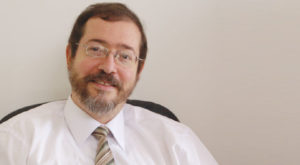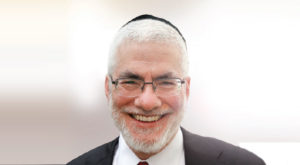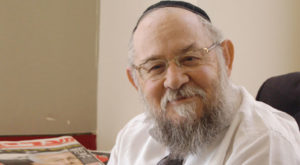Inbox: Issue 864

"How do we combat the pervasive use of technology by our young ones? Introduce them to the joys of creativity"
She Gets Us [Inbox / Issue 863]
I agree with the “mother of many boys” who wrote last week about how disturbing she found the Double Take story of the rebbi who had to take a second job as a cashier to help support his family. The difference is I am the wife of a really special rebbi who gives his life and soul to his precious talmidim.
This mother wrote such a beautiful letter, it brought me to tears. I read it out loud to my family. She really gets us and understands what we have to do to support our families.
I felt the principal in the story handled the situation very poorly. He obviously doesn’t understand his rebbeim very well. Thank you to this wonderful letter writer for putting rebbeim on a pedestal and for the tremendous amount of hakaras hatov she expressed in her letter. It spoke to all of us.
A Proud Wife of a Wonderful Rebbi
From a Different World [“Zei a Mensch” / Issue 863]
I just wanted to let you know how gratified I was to read your article on the Mashgiach, Rabbi Shlomo Carlebach.
I was one of the original four talmidim who was zocheh to hear the Mashgiach’s shiurim in Chaim Berlin every Thursday afternoon over 50 years ago. The shiur grew from week to week with the only limitation being space, as it was given in the Mashgiach’s office — otherwise the entire beis medrash would have enthusiastically come to hear the Mashgiach’s extraordinary Torah.
There were two distinguishing characteristics of the shiur. One was the ability to take the most complex thought and explain it in such a manner as to be understood by all — which itself was the result of (a) the Mashgiach’s tremendous talent for explanation, and (b) almost as importantly, the enormous amount of preparation that went into the shiur — not so much what the Mashgiach was going to say (he had a very good idea of what he was going to say) as how he was going to say it so it would be understood.
The second defining characteristic of the shiur was the Mashgiach’s extraordinary skill of “Toras Hashem temimah” — to explain how seemingly diverse concepts of Hashem’s Torah all fit together.
After the shiur, about a dozen of us would walk from yeshivah to Brooklyn College for night school and on the way, we would review the shiur. What was evident from these discussions is the amount of thought generated not only in the bochurim who attended the shiur, but also in those who listened in as we reviewed it.
While every shiur was a gem, every once in a while the Mashgiach would say something even more extraordinary in the name of a gavra rabba. While I never asked the Mashgiach who the gavra rabba was, I had a pretty good guess who it was. You see, we were privileged to hear Torah from a different world kept alive by a devoted son.
I must confess that I had read the Mashgiach’s book on his father, Ish Yehudi, many times, but I was never able to bring myself to finish it — primarily because I knew the ending, even if I didn’t know the details. However, in truth, his father’s passing is not the ending. Chazal tell us that whoever’s efforts bring forth a tzaddik never dies; rather he remains alive in those who carry his legacy into the future.
My wishes to the Mashgiach for gitte, gezinte, lange yahren with nachas and simchah, allowing him to continue his great work of transmitting the great legacy of Torah of previous doros into the present age.
Avrohom Backenroth
Don’t Let It Die [Stretched to the Limit / Issue 863]
Your feature about professional burnout was excellent. I particularly appreciated Rivka Resnik’s journey and her affirmation that “rerouting a dream doesn’t mean the death of a dream.”
Someone I know well and admire greatly worked in kiruv for well over a decade. Eventually, for a number of reasons, it was no longer feasible for him to continue in that job, and he had to move on. He’s worked in several entirely unrelated industries since then, but he never let his love for kiruv die. He often hosts not-yet-religious students, he joins shabbatonim on a regularly basis, and he creates a kiddush Hashem wherever he goes.
He told me that while he struggles with spending his days in the secular workplace, moving from kiruv as a livelihood to kiruv as a passion enabled him to approach it differently. Since money is no longer a part of the picture, he can be selective about where he puts his energies, investing in the places and people for whom he feels he can make the biggest difference. He doesn’t have to justify why or what he does, doesn’t need to show “results” to anyone. It’s entirely between him and Hashem, a pure expression of love for his lost brothers.
We may have to reconfigure where we spend our work hours, but we should never let our gifts and kochos atrophy; there’s always a place we can use them, and someone who can benefit from them.
Batsheva Berman
Put It First [Inbox / Issue 862]
I’m more than a little disturbed by all the letter writers bashing the “wealthy board members” for not paying the rebbeim more. Here’s a counterpoint from a “savvy businessman” on a board.
How about parents take their obligation to provide education for their children seriously? How about when allocating expenses, putting tuition first and not last? How about having a smaller house or driving a slightly older car, or taking a more modest vacation, or not having your children decked out in this year’s styles, or making a slightly smaller bar mitzvah or wedding, so you can contribute more and your children’s schools can pay your children’s rebbeim more? How about you accept upon yourself to raise what you can’t pay?
The reason we can’t pay rebbeim more is because tuition is the first thing to go, not the last. So instead of trashing those who give of their time and energy to make schools function and take upon themselves million-dollar budget deficits, ask yourself what your values are and what you are willing to sacrifice for.
Mordechai Lerman
The Joys of Creativity [The Rosen World / Mishpacha Jr./ Issue 863]
I am delighted with the write-up by Chaya Halberstadt on Reb Yossi Rosen’s fabulous fantasy playground that he crafted so magnificently on his own, in his spacious backyard. I believe, however, that this article should have been published in the main magazine, not designated for the younger set in Mishpacha Jr.
Adults, as well as children, all stand to benefit from infusing creativity into our everyday lives.
Rebbetzin Feige Twerski, in a recent public address, discussed the phrase “Peru u’revu” and explained, quoting from the Zohar, that this refers not only to bearing and raising children, but also refers to creativity. Create! Hashem has so graciously granted each of us talents and various gifts that we should ideally be using to enhance our lives, as well as the lives of our families and communities.
Kudos to Reb Yossi Rosen for using his G-d-given talents so beautifully! Visiting his backyard, with its very realistic pirate ship, enticing circus train, 12-foot giraffe, and much more is indeed entering a world of vivid color and joy. And the front yard is equally enjoyable! Take note of the monkeys swinging in the tree, and the latest — a family of ducklings headed out for a walk, with the mother duck proudly leading the way. What a delight! The passion to create is so powerful.
How do we combat the pervasive use of technology by our young ones? Introduce them to the joys of creativity. Make it a family project. What a great bonding experience this would be.
Miriam Liebermann
Optimism and Miracles [Aftershocks in Karlin / Issue 862]
Although I am generally impressed with Yochonon Donn’s coverage, I was very surprised at the conclusion of his piece regarding the Karlin-Stolin tragedy. The final sentence gives the impression that the community is overcome with anxiety and depression. Being familiar with the Karlin-Stolin community in Eretz Yisrael, I can attest to the utter misrepresentation of that statement.
Since the tragedy, there was an incredible amount of optimism and incredible miracles. They are an exemplary community full of emunah and bitachon and have been bursting with chesed in innumerable ways.
It is true that they were hit hard, but it has brought out reservoirs of strength and courage.
May we all learn from their exceptional example.
Name Withheld
Mentor and Friend [A Torah Heart / Issue 862]
On behalf of the Lowenbraun family, we want to thank Gavriel Horan and the Mishpacha magazine for a beautiful tribute to our father, Rabbi Yitzchok Lowenbraun.
We feel it is important to mention someone who was inadvertently omitted and played a very important role for our father in his early years in NCSY. Rabbi Baruch Taub, who was the national director of NCSY at that time, had the foresight to see out-of- the-box and hire our father for the position of regional director of the Atlantic Seaboard region of NCSY. Rabbi Taub was a true mentor and lifelong friend to our father and we are very grateful for his friendship and all that he did to ensure our father’s success.
There are many more people who should and could be mentioned, and b’ezras Hashem we are working on a book that will be much more encompassing. If you have any stories, experiences, or memories that you would like to share, please reach out to Mishpacha for our contact information.
The Lowenbraun Children
Whole New World [A Torah Heart / Issue 862]
Thank you for the beautiful tribute to Rabbi Lowenbraun a”h.
Having grown up in Baltimore in the ’80s, at a time when many of our great founding community leaders were still alive, it still astounds me when I hear the backstory to people and places I always took for granted.
I had no idea that Rav Ruderman was involved with the establishment by NCSY of the Atlantic Seaboard region. And while I realized that Rabbi Lowenbraun was chassidish, I did not know about his Bobov background. But it makes a lot of sense, because he, along with his special rebbetzin, brought that varmkeit along to the shabbatons, balanced with honesty that came from a place of true caring and sensitivity.
I attended what we called “Junior NCSY” for a very short time. And while it wasn’t for me, it did leave an impression in terms of kiruv kerovim that I recognize today and one that I would like to be makir tov for.
Having lost our father at a young age, and with a mother who was a baalas teshuvah, our family didn’t sing zemiros on Shabbos. The Shabbos singing I experienced at those shabbatons was a whole new world for me — and one that I loved. Bentshing was sung with such fervor and enthusiasm. And finally, the Havdalah that NCSY had and still has today is just too powerful and beautiful to properly express.
I am sure this is the secret to their success. May the Rabbi and Rebbetzin be meilitzim yesharim for all of Klal Yisrael.
Judy Landman
In Their Embrace [A Torah Heart / Issue 862]
A lot has been said about the Jewish youth who were affected by Rabbi Lowenbraun and his esteemed rebbetzin. I originally met them when I was young but by the time I came back to town I was already older, finishing university, and immersed in the Baltimore community with family and plenty of friends. I was frum and it wasn’t as if I was looking for something or needed anything… or did I? Because week after week I found myself drawn to the Lowenbraun table for Shalosh Seudos.
Their open-door policy was magical, and through it people came from all walks of life. Yet somehow it never felt unusual — in fact, it felt quite normal. We were infused, as Shabbos was nearing its end, with divrei Torah, stories, and the most beautiful soul-stirring niggunim that touched your soul in a way that felt tangible.
And what a special treat it was when their relatives would be in town for Shabbos. They treated us like family too, and we felt privileged to be embraced by the Twerski dynasty. By the time Shabbos was over, we left on a spiritual high that would last the entire week.
We were zocheh to marry off our first child last year and due to Covid, we were forced to make the wedding in New York, far from our home and community in Toronto. It was a beautiful simchah, but only a few close friends and family could be there for us. In the middle of the wedding, I was unexpectedly approached by a sweet boy who explained that not only was he a good friend of my son-in-law Tzvi, but that his grandparents were the Lowenbrauns. I felt absolutely astonished by the hashgachah. This was a powerful and loving message sent just when I needed it the most: “You’re not alone, we’re here with you too; even 25 years later our connection still exists.”
Before leaving the shivah in Baltimore, I couldn’t help but walk around and take one last look at the house, and especially at the legendary dining room. With both Rabbi and Rebbetzin Lowenbraun gone, it is truly the end of an era. Not only were they devoted to Klal Yisrael, but their house was too, and for that, I will be forever grateful.
Joely (Parker) Bernstein
Becoming Me [A Torah Heart / Issue 862]
Thank you for the article about Rabbi Lowenbraun. Although the article touched on many important aspects of the Rabbi, I think it missed an important aspect to him.
I’m not a fan of the whole “kiruv as a business model to make people frum,” particularly as it pertains to the Rabbi. Kiruv should be where one learns by a role model’s example rather than a machine to be tweaked for an end goal of “making someone frum.” This approach discounts all the individuals who may not be frum (whatever that really means) but whose lives were forever changed or bettered by the Rabbi and Mrs L.
These people include the public school kid who may just light a candle to welcome Shabbos. Or the one who remembers a song. Or the one who’s involved in their synagogue because they feel it is important, because of the Rabbi. Or the one who may have married a Jew because of the Rabbi. I know these people. Their lives were forever changed because of the Lowenbrauns.
I’ll even go further and say I didn’t become “frum” because of the Rabbi. I remained observant because of him. To me Judaism was the coolest thing because of the Rabbi. I didn’t need a fur hat. I could just be me — just as he was just him. I loved the energy of being around him. I became me because I saw that I could.
The interesting thing is that during the week I saw him as a regular guy: Working a day job. On the phone. Raising a family. Regular clothes. Getting things done. Always living Judaism day to day. But Shabbos, when the fur hat and beketshe came out, it was the holiest and most regal thing in the world, the pinnacle of everything. It was when we got to spend time together. Learn. Sing. Talk. Put the work and school stuff aside and become something else.
I wanted some of that majesty. I wanted to be surrounded by it. I wanted to be with the people. I wanted the porch swing. He just did what he did. That’s what kept me.
E. G., Los Angeles, CA
Let’s Show Our Compassion [Borderline Catastrophe / Issue 861]
Yochonon Donn’s report from the US-Mexico border (May 18) mixed courage, great writing, and trademark Jewish sensitivity to the plight of others.
Just a few days before his petirah, Rav Shmuel Salant was interviewed by a famous reporter, James Creelman, who was extremely taken by him. The piece that he subsequently wrote appeared in the New York Times edition of October 24, 1909. Creelman reported that when Rav Shmuel heard some of the story of the recent massacre of tens of thousands of Armenians by Muslims, he said, “It was dreadful. I sent a hundred francs to the Christian relief committee as soon as I heard of it. It was not much, but it was all I could spare, for I am a poor man.”
Rav Shmuel Salant responded to pain and suffering by trying to do something. Sometimes, the best that we can do is listen to those who want to tell their stories, and acknowledge their pain. One of us (Adlerstein) remembers hearing Rav Henoch Leibowitz ztz”l telling his talmidim during the Biafra famine that they were not obligated to take time off to collect money for the cause, but they were not allowed to be indifferent either. A Jew must always feel the pain of others.
Another of us (Cooper) had people in Nigeria lined up for hours outside his hotel room. All they wanted was for someone to listen to their stories of persecution by Muslims, just as Donn listened to the stories of the would-be immigrants.
As Jews find themselves under attack all over the globe, it is important to counter the libels by showing the compassion of the Jew. We shared Donn’s piece with friendly leaders of Hispanic evangelical denominations. His essay was received with appreciation.
We applaud him for writing it, and Mishpacha for publishing it.
Rabbi Abraham Cooper
Rabbi Yitzchok Adlerstein
The Simon Wiesenthal Center
Los Angeles/Jerusalem
(Originally featured in Mishpacha, Issue 864)
Oops! We could not locate your form.








